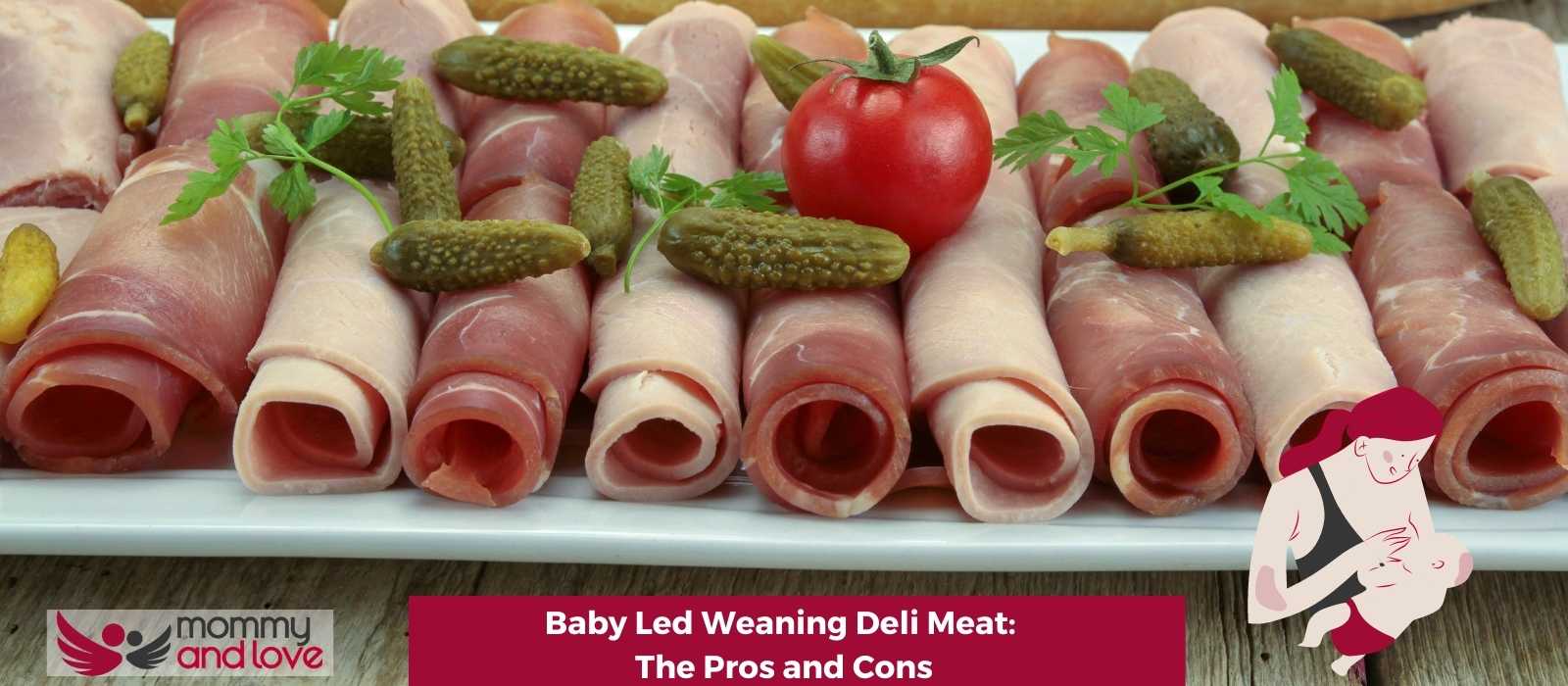For baby-led weaning (BLW) parents, deli meat can be a great way to introduce new flavors and textures to their baby’s diet. These finger foods are usually thinly sliced and easy for the baby to chew. It is also a good source of protein and iron. In this blog post, we will discuss their benefits for babies and give some tips on how to introduce them safely.
What Is Considered a Deli Meat?

Deli meat is any meat that has been cooked or cured and then sliced thin enough to be served cold.
These types of meats include turkey, ham, salami and bologna. Some of them are made from beef or pork, but the most popular ones are made from poultry.
Deli meat is any meat that has been cooked or cured and then sliced thin enough to be served cold. These types of meats include turkey, ham, salami and bologna. Some of them are made from beef or pork, but the most popular ones are made from poultry.
They are commonly sold in delicatessens and supermarkets. They can be bought pre-packaged or freshly sliced at a deli counter. They differ from bacon as they are pre cooked.
Can You Give An Infant Deli Meats?
Babies can eat deli meat, but it is important to be aware of the risk of listeria.
Most babies aged 7 – 12 months of age should not eat them that have been freshly sliced at a store or delicatessen, even if they have already started eating solid foods. This is because there is a risk that the meat contains listeria and other bacteria that can cause illness.
The risk of listeria and other bacteria being on the surface of the meat is reduced if it is heated until it is steaming hot. For this reason, babies over 7 months old can safely eat deli meats that have been heated up until they are steaming.
What Are the Risks of Deli Meat for Babies?
The risks for babies include the risk of listeria and other bacteria. Listeria can cause illness in babies and is a particular concern for parents. For this reason, it is important to be aware of the risk and only give freshly sliced deli meats to babies over the age of seven months because they can affect their growth and development. Heated deli meat is a safe food for babies over the age of seven months.
Most lunch meats and cold cuts contain high amount of sodium and nitrates, a chemical used to preserve deli meats and other types of processed meats such as sausages and hot dogs, which are known carcinogens, which means they can cause cancer.
When you eat lunch meat, the nitrates are converted into nitrosamines in your body, which are even more dangerous substances. Studies have shown that these nitrosamines can cause cancer in humans, particularly stomach cancer.
Most babies don’t need to eat lunch meat for protein; there are plenty of other options that give them what they need (white fish, sushi, eggnog, chicken, veggies, horseradish, fresh meats, breast milk, formula or solid food) without exposing them to the risks associated with nitrates and nitrosamines.
Are Thinly-sliced Deli Meats Choking Hazards to Babies?

Yes, they are a choking hazard for babies who are starting to self-feed. Table foods such as deli meats or cold cuts are usually thinly sliced, which makes them easy to choke on.
If you are giving them to your baby, make sure it is cut into small pieces and watch your baby carefully while they are eating.
Can Babies Be Allergic to Deli Meat?
Babies can be allergic to them. If your baby has a reaction after eating deli meat, such as vomiting, diarrhea or a rash, stop feeding these foods to them and see your doctor.
When it comes to food allergies in babies, eggs, milk, peanuts and soy are the most common offenders. But some babies have an allergy to something you might never expect: meat from the deli counter.
In fact, allergies to meats like beef, lamb and pork (as well as other proteins like chicken or turkey) are quite rare. But they do happen. And when they do, they can be scary for parents. The reaction is often very severe.
Can Babies Have Deli Turkey?
There are a few things to consider before you share a freshly cooked turkey with your baby.
First, make sure it’s cooked through. It is not cooked through when you buy it, and this makes it unsafe to eat for babies. Undercooked or raw foods can lead to foodborne illness.
Second, make sure you’re buying a turkey that has no added nitrates or nitrites. Nitrates and nitrites are compounds used during the curing process, and they can be harmful to your baby’s health.
Third, make sure the turkey meat or ground turkey isn’t too salty. Even if it’s low-sodium, deli turkey still has more salt than most other meats.
If all that checks out, go ahead and slice up some deli turkey and feed it to your little one. Cut it into thin strips so it’s easy for him to pick up and eat.
Takeaway
So, can babies and toddlers eat deli meat? The answer is yes and no. There’s nothing in deli meat that can’t be found by eating other safer and healthier foods such as fruits and vegetables. However, it’s always best to avoid giving your baby anything processed or filled with additives. And if your baby doesn’t like them, that’s okay. You can try adding it for future meals.
Introducing meat as a new food for the first time can be a bit tricky but you should opt for soft meat such as beef fillet instead of processed meats. Well-cooked ground meats and cottage cheese are good alternatives if you are looking for protein-rich foods.
If you want to give them a little taste of something special in small quantities every once in a while, go ahead and give them as finger food– but make sure it’s properly cooked and are cut into small pieces!
And as always, talk to your baby’s doctor if you have any concerns or if you want a professional medical advice.

This article was written by Sandra Baker – full time writer and the mother of four amazing kids (including twins!)
She’s also a breastfeeding counselor and has spent years helping new parents learn how to care for their children. When she’s not writing or caring for her children, Sandra likes to spend time reading and taking walks with her husband.




